Showing 61–65 of 91 results
-
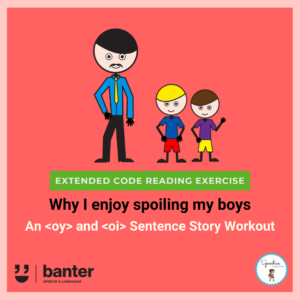
$4.99 including GST
In this reading exercise, students read many words containing <oy> and <oi> (e.g. “boy”” and “coin”). For efficiency and engagement, we find it best to work on extended code targets like <oy> and <oi> while also working on reading fluency (accuracy, speed and expression) with sentences and short passages.
This reading workout is about a father who enjoys spoiling his sons: two boys, named Roy and Troy.
This no-prep exercise can be used for:
- decoding practice; or
- word or sentence level written dictation (encoding) practice.
-
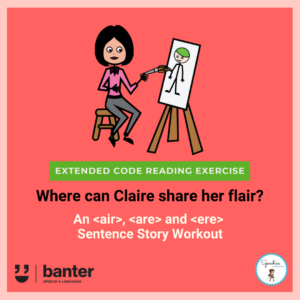
$4.99 including GST
In this reading exercise, students read many words containing <air>, <are> and <ere> (e.g. “fair”, “dare” and “there”). For efficiency and engagement, we find it best to work on extended code targets like <air>, <are> and <ere> while also working on reading fluency (accuracy, speed and expression) with sentences and short passages.
This reading workout is about Claire, a dairy farmer by day, and an artist by night. She won’t share her art with anyone because she is too shy. Does she need a push? Let’s find out!
This no-prep exercise can be used for:
- decoding practice; or
- word or sentence level written dictation (encoding) practice.
-
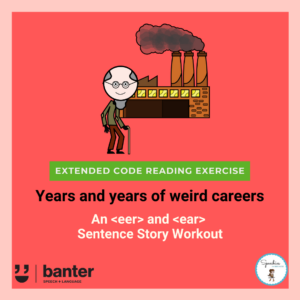
$4.99 including GST
In this reading exercise, students read many words containing <eer> and <ear> (e.g. “cheer”, “dear”). For efficiency and engagement, we find it best to work on extended code targets like <eer> and <ear> while also working on reading fluency (accuracy, speed and expression) with sentences and short passages.
This reading workout is about a mysterious stranger struggling to survive in a tough world. He seems friendly. But, there’s something not quite right here. Should we be worried? Let’s find out!
This no-prep exercise can be used for:
- decoding practice; or
- word or sentence level written dictation (encoding) practice.
-
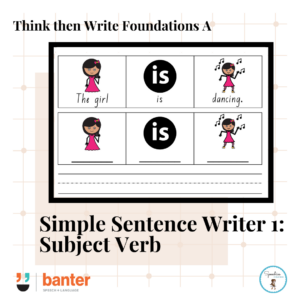
$6.99 including GST
This is the first in our series of simple sentence writers, focusing on Subject-Verb constructions, e.g. “The boy is swimming.” (25 pages).
Many writing programs start at the discourse (or text type) level, with tasks like recounts, procedures, and stories. For many students, however, this is too advanced and sets them up for failure. Texts are made up of paragraphs, and paragraphs are made up of sentences. Let’s start with sentences and work our way up!
Some students, including students with language and other learning disorders, dyslexia, and people who are learning English as a second language, have difficulties writing simple sentences. In this series, we provide simple scaffolds to help people to understand, speak, and write in grammatically correct sentences.
-
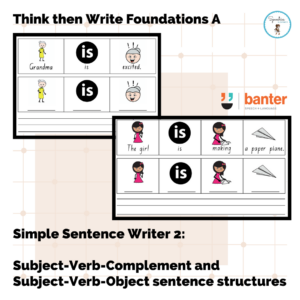
$6.99 including GST
This is the second in our series of simple sentence writers, focusing on Subject-Verb-Complement and Subject-Verb-Object constructions, e.g. “The boy is happy.” and ”The girl is making a cake.” (44 pages).
Many writing programs start at the discourse (or text type) level, with tasks like recounts, procedures, and stories. For many students, however, this is too advanced and sets them up for failure. Texts are made up of paragraphs, and paragraphs are made up of sentences. Let’s start with sentences and work our way up!
Some students, including students with language and other learning disorders, dyslexia, and people who are learning English as a second language, have difficulties writing simple sentences. In this series, we provide simple scaffolds to help people to understand, speak, and write in grammatically correct sentences.






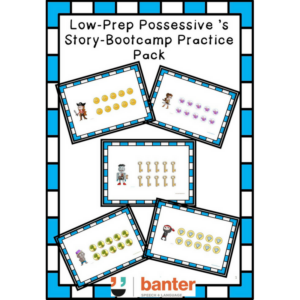 (L263) Low-Prep Possessive ’s Story-Bootcamp Practice Pack
(L263) Low-Prep Possessive ’s Story-Bootcamp Practice Pack 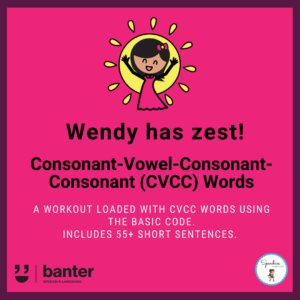 (R214) CVCC Words in Sentences: Wendy has zest!
(R214) CVCC Words in Sentences: Wendy has zest! 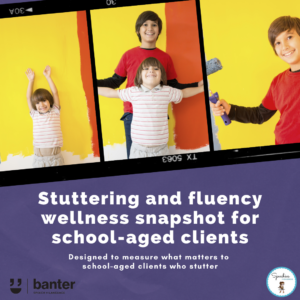 (S115) Stuttering and fluency wellness snapshot for school-aged children who stutter
(S115) Stuttering and fluency wellness snapshot for school-aged children who stutter